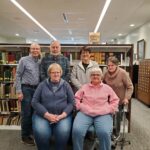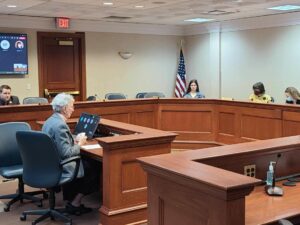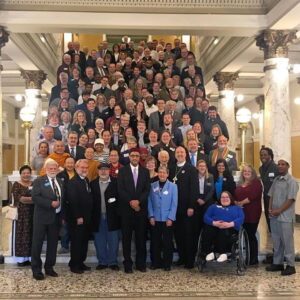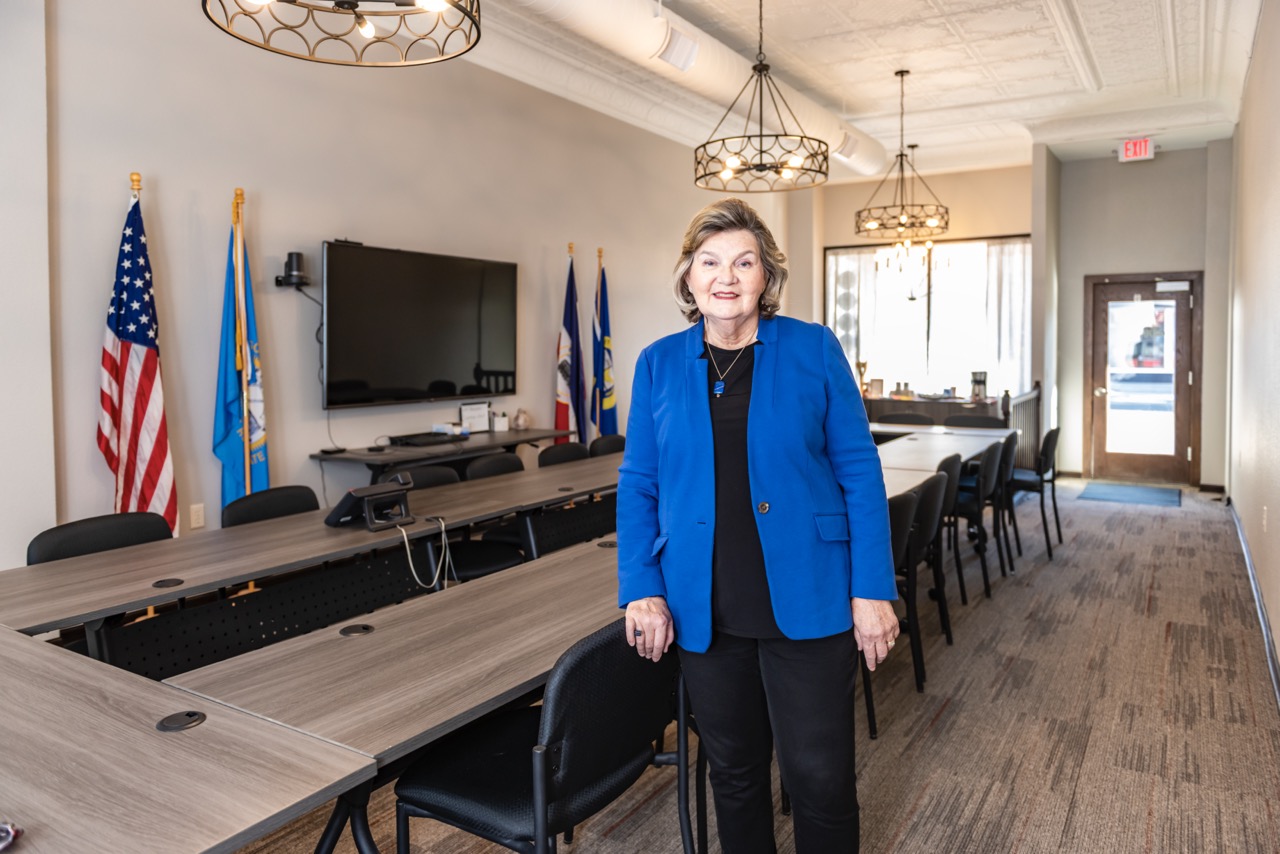

Every year, the beginning of the South Dakota Legislative session gets some people excited about opportunities and challenges. Some worry about onerous new burdens or needed benefits. Some fear wrong directions. Many seem unaware. But every year, the Legislature makes changes in all of our lives, whether we like it or know it or not.
A number of people pay close attention to what’s happening in Pierre and do their best to steer things their way—or that of their clients. Lobbyists don’t always have a great reputation, but when 500 bills are introduced in a session lasting just a little longer than a month, often they’re the reason legislators know what they’re voting on.
Aberdeen has been home to a few lobbyists over the years, who have focused on a variety of interests, from the region and area communities to businesses, nonprofits, churches and schools to groups of people with little voice. Currently, three Aberdeen people make frequent connections with legislators on varied issues in Pierre or elsewhere.
COMMUNICATING
Julie Johnson is the dean of lobbyists for Aberdeen and maybe the state. She’s sometimes referred to—and relied on—as the “institutional memory” for the Legislature. She’s a “go to individual” in the words of Representative Carl Perry. Only two other lobbyists in Pierre can compete with her 45-plus years on the job. She describes her path to the job as “a tale of internships,” including stints with Attorney General Bill Janklow, the Legislative Research Council, the Constitutional Revision Commission, and the Municipal League, among others. A USD Law School graduate, she credits faculty there with helping her obtain internships. She also served as Secretary of Labor under Governor Bill Janklow, and later as Secretary of Revenue. Between cabinet posts, she ran the Industry and Commerce Association of South Dakota. Practicing law in a firm with clients who needed a lobbying presence got her into the role. She lived and worked in Pierre for 25 years before returning to Aberdeen in 2007 when she began lobbying on behalf of Aberdeen area interests in her role with Absolutely!Aberdeen and Prairie Vision, a growth initiative and its regional development arm.
In her seventh year as Aberdeen Public Schools superintendent, Becky Guffin occasionally finds herself in the role of lobbying in Pierre or through local contacts with legislators. Overall she sees herself as “a strong advocate for public education and for issues that support the mission of our school system.” She might speak on behalf of the Aberdeen school district, the Associated School Boards of South Dakota (ASBSD), the School Administrators of South Dakota (SASD), and the Large School Group—which is composed of the state’s 20 largest school districts. Each of the last three organizations has its own lobbyist but will also ask school representatives to speak on issues. The organizations also allow their member schools to testify contrary to the organization’s position when it’s in the school’s interest. In addition to the state organizations, Guffin was elected to the national superintendents association’s governing board, where she also looks at issues in other states and at the federal level.
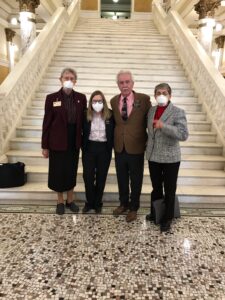
Sister Kathleen Bierne, Representative Linda Duba, Senator Wayne Steinhauer and Sister Lynn Marie Welbig at the South Dakota Capitol.
Sister Kathleen Bierne lobbies for the Presentation Sisters regarding justice issues. In the past, the Sisters used to have people who went to Pierre for specific issues, spending perhaps a day or week there. In 2016 the Sisters’ leadership group felt they needed a more full-time presence, in particular due to emerging immigration issues. They asked Sr. Kathleen and Sr. Lynn Marie Welbig from Sioux Falls if they would do it, and they agreed (in Sr. Lynn Marie’s words, “they were ‘invited’ [as in ’sent’]”). Initially their main issues were the grocery tax, immigration, education and teacher pay, the environment, and Medicaid expansion. Now those issues have expanded to include LGBTQ rights, abortion, Native American issues, and the education curriculum. “The questions have become broader than when we first started,” Sr. Kathleen noted. Due to COVID, they didn’t go in 2021 but worked from home via Zoom. In 2022, the pair, working with a third person, spent an abbreviated time in Pierre. This year, the three will take turns.
In describing the job, the three women interviewed said it’s primarily about communicating one’s interests to legislators. As a lobbyist representing others, Johnson adds, “Solid research skills and getting to know the clients’ issues” to the list. “The client needs to teach you the issue,” she explained. Representing a number of clients in the Aberdeen area, she notes that her work has developed out of the region’s needs. Another part of the job is staying informed and seeing where issues might connect. “You need to stay plugged in to Pierre,” she says. “What are they studying? Who is doing it? You need to work with both sides of the aisle.”
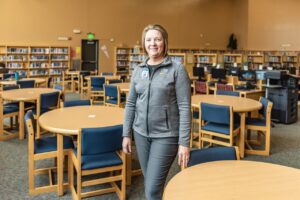
Dr. Becky Guffin is a strong advocate for public education and issues that support the mission of Aberdeen’s school system. Photo by Troy McQuillen.
Much of Guffin’s lobbying occurs away from Pierre. She attends all Aberdeen cracker barrels and visits with legislators about upcoming issues. The local legislators “are open to direct communication,” she notes, “and I know the best times to call.” Often she goes to Pierre to meet with legislators but not to testify. She’s testified a few times but does more direct communication with legislators—which can be a lot since Brown County is touched by four different legislative districts.
Making the point that there’s more to the legislative process than what happens on the floor, she notes that sometimes she’s asked to provide information to legislative summer study committees. “Right now there’s a juvenile justice summer study,” she said, “and we’ve been asked for information on that topic.”
Before the session, the Aberdeen school district also invites legislators to the school to meet with staff. ASBSD also has regional meetings with school boards to provide information and get feedback. “It’s always good to participate in those,” Guffin notes and adds, “It’s really the role of the superintendent to be involved in this. Tax dollars fund public schools, so you need to be in tune with that.”
Sr. Kathleen agrees that the basic job is to follow the issues, in her case those that especially impact people with less voice in the state. She’s learned to take advantage of opportunities to meet with legislators in more informal settings. “For example,” she says, “you can catch them at lunch, and sometimes you can go into the chambers to talk to them at their desks.” Legislators don’t always want to be found, however, and she was amused to recall Sr. Lynn Marie spot a legislator they wanted to talk to, and when he noticed and hurried up the stairs, she took off in pursuit.
UPS AND DOWNS
Satisfaction in lobbying can seem to be at best to be a glass half-full. “I learned to choose my battles, to join forces, to get what you can,” Sr. Kathleen observed. “You won’t get everything you want.”
Guffin points to a very satisfying experience. Gov. Dennis Daugaard appointed her to the Blue Ribbon Task Force to study school funding, a process that led to the ½ cent sales tax, which provided the largest increase in funding for schools and teacher salaries in decades. “It was very satisfying to be part of it and to watch the monumental passage of a bill that’s very beneficial to schools,” she said. “It’s not easy to raise taxes in our state, and it took till the last day.”
Surprisingly, it’s not always easy to reduce taxes either. Sr. Kathleen notes that not all victories are in the form of approved bills. “Bills to repeal the food tax have been raised for many years,” she said. “It was satisfying to at least get them introduced, and last year it even passed in one house—before the other defeated it.” Rep. Perry noted that Sr. Kathleen “complimented me last session for voting to eliminate the food tax.” She says it’s also satisfying that immigration isn’t an unusual thing but a normal issue the Legislature deals with each year. “Years ago it seemed to be ‘We don’t want these people coming,’ and now it’s ‘How can we work with them.’ It’s gone from a fear status to how can we make it good for both of us.” For her, the most important experience has been “the realization that our being there makes a difference.”
Johnson identifies a number of occasions where legislative action brought benefits and challenges to the region and the state. Each Northern State University building bill (Lincoln Hall, the new suites, Johnson Fine Arts Center renovation) have been very satisfying, she said. “Although the NSU building bills have all been gift-funded or federally funded (Lincoln Hall), they still need legislative approval”—requiring a 2/3 vote. She adds, “People don’t always understand the geographic footprint we serve, particularly in education, especially those in Pierre and Sioux Falls.”
“The housing package in 2022 was huge,” she said. “It authorized $200 million of state and federal funds for infrastructure, which is the hardest part of housing to pay for. The nonprofit housing groups of the area put together the proposal, a process in which I was deeply involved.” She also pointed to highway funding packages, the teacher salary package—“Most of my clients wanted their names attached to that”—workers’ comp reform, a major economic development package known as “Building South Dakota,” and the state water plan—“That’s important in terms of WEB water and regional needs.”
Bringing a long-term perspective to the legislative process, Johnson observed, “It’s interesting to watch the change in the ability to impact policy in Pierre, particularly with term limits. Turnover in the Legislature is large. You need to re-teach everyone.” Conversely, “I go back to when [Republican] Joe Barnett was majority leader and [Democrat] Lars Herseth minority leader. Brown County was rocking it. It was a real era of diplomacy. I moderated cracker barrels every weekend with Lars and Joe on each side of me, and they got along well. They could do a lot of problem solving.”
Sr. Kathleen has learned the importance of understanding the “intricacy of the process. Because South Dakota is not balanced politically, it’s easy to kill bills the committees don’t want to hear.” She was disappointed that proposed legislation from tribal legislators for more charter schools failed in committee. “It’s a way they can keep their culture and language alive,” she noted, “and having discussion on the Senate or House floor helps educate all of us on these issues.”
Guffin noted she’s heard from legislators about handwritten notes Sr. Kathleen sends them. “When everything at the Legislature is done electronically,” she said, “handwritten notes stand out.” Laughing, Sr. Kathleen pointed out that from the gallery, she’s seen some legislators open the notes at their desks on the floor and throw them away, “but some tucked them away for later too.” Her strategy, she says, is that when so much of what they get is electronic they can determine quickly which side a message is on, but “With handwritten notes, they have to read it to know where it stands.”
SPEAKING UP FOR THE AREA
“It’s become a need for the region to have someone to speak up for unique area needs or business models that will work in the region,” Johnson believes. “Sometimes the business model Pierre thinks of doesn’t fit our area. It’s too urban.” Someone needs to be there “to listen and speak up when they’re speaking a vocabulary that doesn’t fit our rural vision.” She sees the issues to listen to this year as being housing, human resources and employment issues, childcare, and aquatic invasive species. Economic development is also always important. “We have to speak up occasionally to be sure Sioux Falls isn’t the only community that gets to grow,” she said. She added that she has worked to be sure that available federal pandemic money can be available for this region, like childcare, water, workforce, etc.
Johnson clearly has an impact. “She has a wealth of knowledge and is a resource for legislative members to contact on local and statewide issues,” said Rep. Perry. “Her experience makes a difference for our part of South Dakota.”
Both Sr. Kathleen and Superintendent Guffin acknowledged the support and knowledge Johnson shared with them as they learned the job. Johnson also had many mentors in various aspects of the government process. One she specifically mentioned was one of her Aberdeen lobbyist predecessors in Pierre, then attorney and now Federal Judge Charles Kornmann.
When Kornmann came to Aberdeen in 1965, he joined the Richardson law firm. They represented the South Dakota Railroad Association and Sperry & Hutchinson Company (the Green Stamps company—google it) in Pierre. “I helped with those lobbying efforts because I was one of the few Democrats available,” he said. For decades, his clients included the, Homestake Mining Company, Scientific Games (who got the contract for the scratch lottery tickets), International Franchise Association (through a referral from Super 8), International Paper Corp., and state associations for optometrists, newspapers, automobile dealers, chiropractors, trial lawyers, and the bar association. He also represented Aberdeen-specific interests such as Kitchen Tune-Up, the City of Aberdeen, K.O. Lee Company, and 3M.
Returning the compliment he received, he added, “Julie Johnson has done a good job for the Aberdeen Chamber and other local interests. She helped me more than once when she was the chief lobbyist for the South Dakota Industry and Commerce Association. We need someone in Pierre to protect Aberdeen interests.”
Like the sausage making it’s often compared to, the legislative process can be ugly, with fights even in a politically one-sided body. Lobbyists don’t always get much credit for being a positive part of the process, but it’s often thanks to them that legislators have a more complete understanding of issues that confront them. While that lobbying help comes from a goal of persuasion, it also reflects an appreciation for the legislators. Sr. Kathleen said, “I have a lot of respect—even for the ones I disagree with for the amount of work they do, most of which happens after dinner because they don’t know till late afternoon/early evening what is on the agenda tomorrow. Toward the end of the session legislators always put in long days, sometimes working until midnight.”
Despite setbacks and challenges, lobbying has its moments. Sr. Kathleen recalled, “When we went back to Pierre in 2022 after working remotely in 2021, people on both sides of the aisle were glad to see us. It kind of reinforced that we made the right decision to come back. It was a sense of acceptance, a good feeling.”
Lobbyists don’t always get what they want, but they do take a stand. We can too. Legislators always say they want to hear from constituents. And we don’t have to go to Pierre to do it. As Guffin points out, it’s something we can do from home. //









